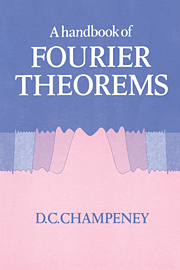Book contents
- Frontmatter
- Contents
- Preface
- 1 Introduction
- 2 Lebesgue integration
- 3 Some useful theorems
- 4 Convergence of sequences of functions
- 5 Local averages and convolution kernels
- 6 Some general remarks on Fourier transformation
- 7 Fourier theorems for good functions
- 8 Fourier theorems in Lp
- 9 Fourier theorems for functions outside Lp
- 10 Miscellaneous theorems
- 11 Power spectra and Wiener's theorems
- 12 Generalized functions
- 13 Fourier transformation of generalized functions I
- 14 Fourier transformation of generalized functions II
- 15 Fourier series
- 16 Generalized Fourier series
- Bibliography
- Index
6 - Some general remarks on Fourier transformation
Published online by Cambridge University Press: 05 June 2012
- Frontmatter
- Contents
- Preface
- 1 Introduction
- 2 Lebesgue integration
- 3 Some useful theorems
- 4 Convergence of sequences of functions
- 5 Local averages and convolution kernels
- 6 Some general remarks on Fourier transformation
- 7 Fourier theorems for good functions
- 8 Fourier theorems in Lp
- 9 Fourier theorems for functions outside Lp
- 10 Miscellaneous theorems
- 11 Power spectra and Wiener's theorems
- 12 Generalized functions
- 13 Fourier transformation of generalized functions I
- 14 Fourier transformation of generalized functions II
- 15 Fourier series
- 16 Generalized Fourier series
- Bibliography
- Index
Summary
Introduction
In this chapter we make some general remarks about Fourier transformation before proceeding to a systematic statement of theorems in the remaining chapters. The aim will be to progress from simple situations towards more complicated ones, and we start in chapter 7 with the socalled good functions. We then progressively consider wider classes of functions and at each stage show in what way the theorems need to be modified. Throughout chapters 7–11 we retain the restriction that both the function and its Fourier transform are locally integrable functions defined almost everywhere on the real line; such pairs we will call ordinary Fourier pairs. Throughout we will assume the use of Lebesgue integration (see chapter 2) unless otherwise stated, and the functions in an ordinary Fourier pair can display fairly ‘pathological’ local behaviour. However, it is possible to consider ‘even worse’ situations, and in chapters 12-14 we show how Fourier transformation can be applied to entities which are not locally integrable and are not even defined through their values almost everywhere on the real line. These entities are the generalized functions, and we will introduce several examples of these including the well known Dirac delta function.
Although in stating theorems it is necessary to distinguish clearly between those which apply to generalized functions and those which apply to ordinary functions, we wish to stress the view that the introduction of generalized functions is only one step in a sequence of generalizations, and that the ordinary pairs can be regarded as special cases within the generalized theory.
- Type
- Chapter
- Information
- A Handbook of Fourier Theorems , pp. 44 - 50Publisher: Cambridge University PressPrint publication year: 1987



